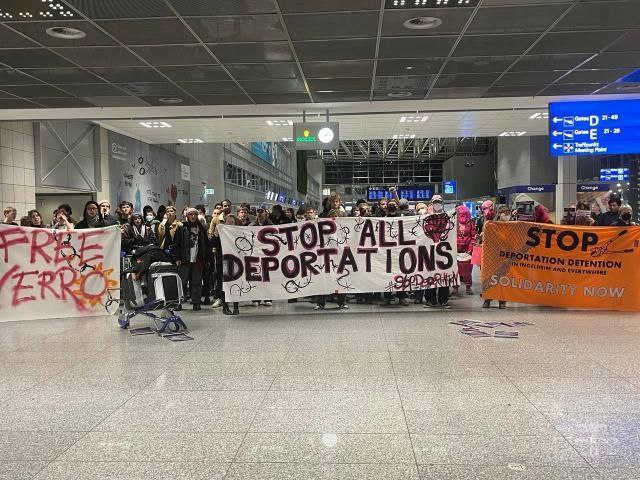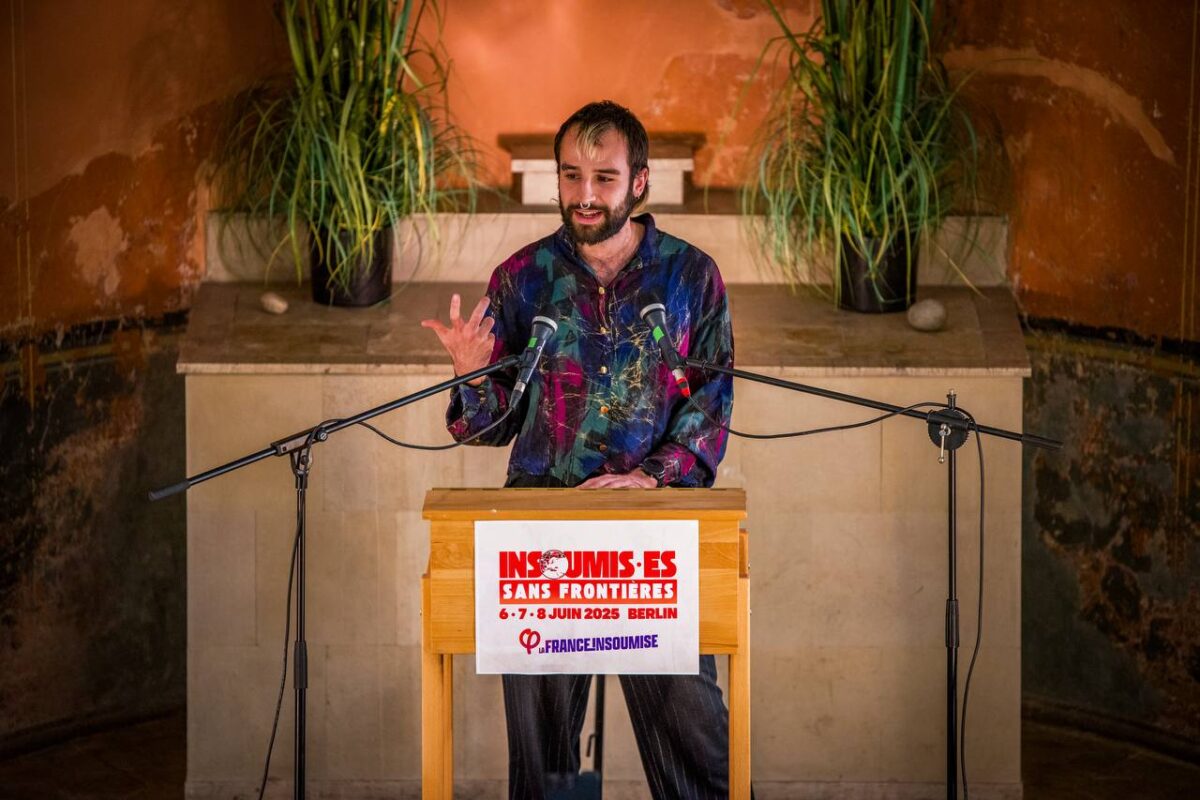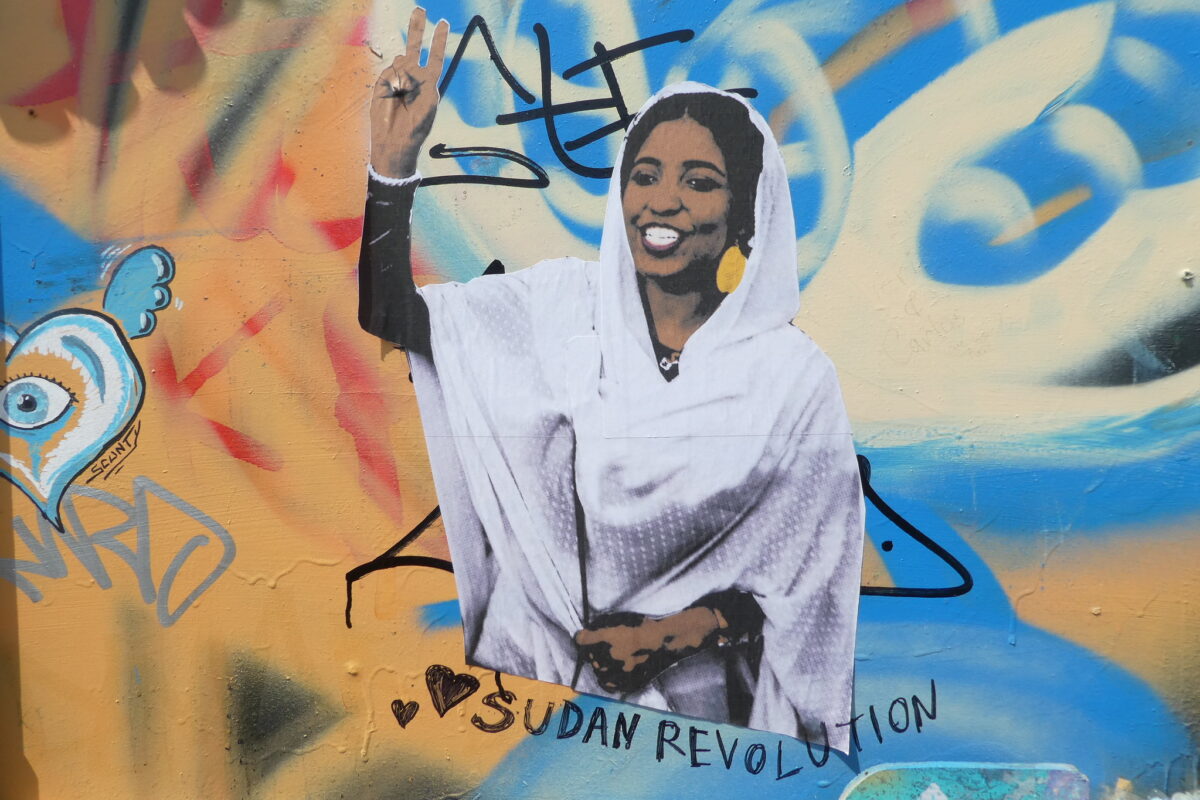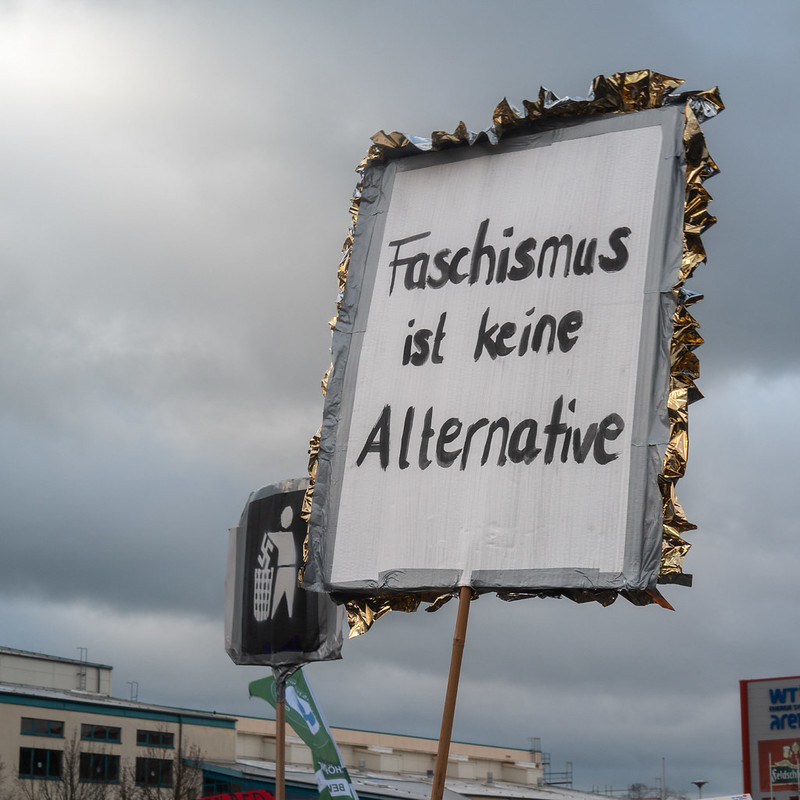On 15 October, “We’ll Come United” activist Yerro Gaye was deported to Gambia. His deportation is a prime example of the German government’s inhumane deportation practices.
Gaye had been living in Germany since 2019 and had built a life here with his partner, friends, and political activities for the rights of migrants and refugees. He had worked for Hermes for two years before the immigration authorities revoked his work permit.
Gaye wanted to marry his French partner. But the authorities blocked the marriage at the registry office—even though he had submitted all the documents for the wedding.
On 30 September, the police then surprised him during a routine appointment at the immigration office in Haldensleben. They arrested him without warning and detained him for two weeks in a deportation prison in Dresden.
Deportation enforced despite protests
Numerous activists, lawyers, and some politicians tried to prevent Gaye’s deportation. Yet, the authorities questioned his engagement and claimed to have no knowledge of it, despite evidence to the contrary. The court also agreed with the authorities.
“The actions of the authorities clearly show that they did not investigate the case carefully, but rather enforced a preconceived position,” said Gaye’s lawyer. Saxony’s Minister of the Interior ignored an application for a “Härtefall”—a hardship relief. Also Gaye’s decision to leave the country voluntarily was not granted.
On 7 October, around 80 people protested in Haldensleben against Gaye’s detention. The local police harassed the rally with arbitrary restrictions and eventually used batons and pepper spray against peaceful protesters, injuring six people.
Death in the Mediterranean
Yerro had reached Europe via the most dangerous border in the world—the Mediterranean Sea. He was rescued by sea rescue services. According to the UN, 3,530 people have drowned or are missing in the Mediterranean Sea in 2024 alone.
The number of unreported cases is much higher—as is the number of people who never even reach the Mediterranean but die on the way there in the Sahara, as the EU has been blocking safe transport routes for years.Even after managing to cross the Mediterranean Sea, European authorities falsely charge and detain people for years for smuggling, like the three teenage boys of “El Hiblu 3” in Malta or many young Sudanese in Greece.
It is our right to live together and pursue our careers. I don’t deserve to go through this just because I am a migrant or black. I promise you that I will remain strong and never let myself be intimidated. My only crime is that I am a migrant.
Yerro Gaye
Deportation is common practice
Unfortunately, Gaye’s story is not an isolated case. The inhumane practice of deportation has been going on in Germany for a very long time. And no one is spared, not even people who have lived here for many years and built their lives here, often with children.
However, the authorities are currently making a special effort to deport as many people as possible. The Mediendienst Integration reported a 20 percent increase in deportations compared to 2024.
Only 1 – 2 % of asylum-seekers are granted asylum
Time and again, refugee councils and human rights organisations report brutal, often night-time attacks by the police, with deportations to unsafe and unknown destinations: Georgia, Iran or Iraq, Turkey, and various countries in Africa.
People are being deported even though these countries often persecute, imprison, torture and even murder minorities and politically active individuals. Political asylum in Germany is a years-long, gruelling and costly battle against the authorities, usually unsuccessful.
According to Mediendienst Integration, only 1 – 2% of asylum seekers actually receive asylum under Article 16a of the Basic Law. “Human dignity is inviolable”—Article 1 of the German Basic Law—does not apply to all people in Germany.
Deportation at any cost
The right to asylum, like other fundamental rights, was enshrined in the Basic Law after the experience of German fascist terror. However, the federal government has already shown on several occasions that it does not shy away from using illegal means to enforce its inhumane, racist policies. Policies that only help fascism.
The list is long: the black-red coalition knowingly violates EU freedom of movement law by maintaining border controls within the Schengen area. It has abolished support for sea rescue operations, family reunification and faster naturalisation. It knowingly supports deaths in the Mediterranean and at other EU external borders with the help of Frontex, the EU border surveillance agency.
Government cooperates with dictators
Germany and the EU are cooperating with dictatorial regimes to keep refugees out. These include countries such as Tunisia and Libya. Germany also concluded the “Turkey deal” back in 2016. Under this deal, the authorities can deport people who have been in Turkey during their flight—which is very often the case for Syrians, Iranians, and Afghans, among others—without thoroughly reviewing their asylum applications. There are repeated reports of abuse and pogroms against refugees in Turkey.
Now the German government is also pushing for a joint agreement with other EU states to enable the deportation of people to “safe third countries”. The model for this is the British “Rwanda deal.” The Netherlands, among others, has drawn up plans to deport people to Uganda.
Systematic criminalisation of refugees
In addition, the black-red coalition is attempting to expand the list of countries considered “safe countries of origin.” Asylum applications from these countries can be rejected across the board.
Because the Bundesrat has rejected the classification of Tunisia, Algeria, and Morocco as “safe countries of origin,” the federal government is now trying to overturn the requirement for the states to approve such regulations.
Violation of human rights
In 2026, the legislative reforms of the Common European Asylum System (CEAS) will come into force. These were drafted during the “traffic light” coalition government with the then Foreign Minister Annalena Baerbock of the Green Party. They virtually abolish the individual right to asylum and even provide for the detention of children.
However, this is not enough for the current federal government: based on the GEAS reforms, the CDU/CSU and SPD now want to convert some accommodations into “special facilities”—effectively prisons. According to the government’s plans, refugees will not be allowed to leave the premises if another EU country is responsible for their asylum procedure under the “Dublin Regulation.”
Just recently, the UN Social Committee reprimanded Germany for the first time because refugees in the “Dublin procedure” have been deprived of accommodation, food, and health care. This new procedure violates social human rights, reports Pro Asyl.
Although the German government has denied basic human rights for refugees and many migrants, there are at least still some non-governmental institutions offering help—if one has the financial means and enough mental strength to seek it. Yet, experienced lawyers, counselling agencies, and NGOs are highly overloaded and even scams have been reported. People seeking protection then need to rely on the support and energy of activists who often fiercely try to fight this inhumane system. Yet, even supporting refugees and migrants is already criminalized in many European countries like Poland and it is rumoured that there are plans to implement similar repression in Germany.
Altogether there are no real safe passages to reach protection and asylum in the EU—not even for people escaping genocides like in Gaza, Sudan, or the DRC. Germany is often celebrated as a country that would have learned from its horrific genocidal past yet, the recent developments, experiences of the people who have been re-traumatized by the system, and those who have perished or disappeared tell another story.




